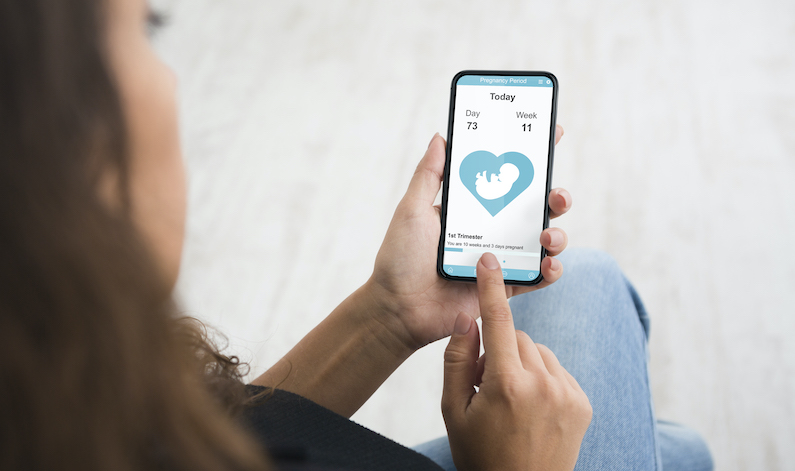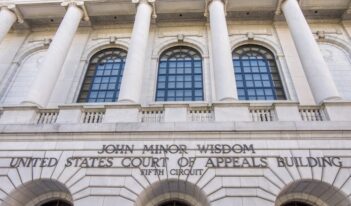
Following the Supreme Court’s decision overturning Roe v. Wade, experts discuss abortion-related data privacy concerns.
As society’s reliance on technology has increased in recent decades, both individuals seeking and opposing abortion services have found that they could access online resources aligned with their respective goals. People seeking abortions could use technology to find nearby abortion clinics and reproductive health guidance, while abortion opponents have used geolocation data to disseminate targeted ads to those visiting specific abortion clinics.
Today, in the wake of the Supreme Court’s ruling in Dobbs v. Jackson’s Women’s Health Organization, technology is creating new complications—even perhaps a double-edged sword. As the ever-evolving digital sphere increases access to safe abortion resources, digital surveillance of those seeking and providing abortions is rising to unprecedented levels with little regulation on what information is protected.
Facebook messages, emails sent through burner accounts, apps that track menstrual cycles, and geolocation data are just a few examples of potentially incriminating digital footprints that confront people seeking abortions. Law enforcement capabilities are seemingly boundless. A woman in Nebraska was recently arrested after police uncovered private Facebook messages that implied she was trying to help her teenage daughter get an abortion.
Even after the U.S. Supreme Court’s 1973 ruling in the landmark case Roe v. Wade, cultural taboos and restrictive state laws presented significant barriers for pregnant individuals seeking abortions, resulting in U.S. residents crossing state boundaries to obtain the procedure safely and legally. But today, the imperatives of cross-border travel and the digital communication needed to arrange access to abortion services prompt new questions about how regulatory agencies and lawmakers can and should address digital privacy in a post-Dobbs era.
The Health Insurance Portability and Accountability Act of 1996 (HIPAA) currently allows abortion providers to provide law enforcement with patient information. Employees who may receive reimbursements from their employers for traveling to another state for an abortion are also not protected by HIPAA.
Federal lawmakers are clamoring to address the looming privacy implications of digital communications related to abortion. A proposed American Privacy and Data Protection Act, for example, would classify reproductive health data as “sensitive” and thus protected. In a separate matter, the Federal Trade Commission appears to be positioning itself to take legal action against a company for licensing data that reveals users’ whereabouts, including visits to abortion clinics.
Although the future after Dobbs still remains hazy, a responsive regulatory framework might emerge to protect the privacy and autonomy of those seeking abortions. In this week’s Saturday Seminar, scholars discuss the digital landscape of data privacy both before and after the Dobbs decision, and they put forward solutions for protecting those who seek abortions.
- In an article in JAMA Health Forum, Kayte Spector-Bagdady, of the University of Michigan Medical School and Michelle M. Mello, of Stanford Law School, argue that abortion providers should consider ways to prevent reproductive health information from being used to incriminate them or their patients. HIPAA permits facilities to disclose otherwise protected medical information to regulatory agencies if such information is deemed relevant to an investigation into the facility’s provision of healthcare, explain Spector-Bagdady and Mello. This means that law enforcement officials can use health care facility records to incriminate a facility or its providers for providing abortions. Spector-Bagdady and Mello argue that providers should seek to mitigate this risk by recording only a necessary amount of clinical documentation and avoiding words within documentation that could be interpreted as evidence of illegality.
- In a recent report, the organization Privacy International contends that the lack of regulation targeting Facebook and other major online sites allows for the development of dangerous health-related misinformation. According to the report, some abortion opposition groups use Facebook advertisements to promote “abortion pill reversal”—an unsafe intervention with a scientifically inaccurate misnomer. In addition, Privacy International warns that anti-abortion groups are using smartphone apps to gather and exploit health-related data from users because such data mining is largely unregulated. One organization, for example, has reportedly created an app that requires users to input personal information and then uses such information to create targeted health care-related advertisements for those users.
- The demand for abortion-related resources through telehealth has been highest in states with policies hostile to abortion, according to Abigail R.A. Aiken and several coauthors in an article published in the American Journal of Public Health. As restrictions on abortions have risen following the Dobbs decision, so has interest in “self-abortion”—that is, in independently seeking abortion medicines online. Despite noting similar motivations of accessibility and convenience for those seeking abortion medications online, the Aiken team found that those in so-called hostile states faced greater barriers, such as greater expenses and travel implications. Consequently, Aiken and her coauthors argue that the populations in states with restrictive policies face the most detrimental repercussions, and therefore they will see an increase in the demand for abortions outside of the clinic setting.
- In an article in The University of Baltimore Law Review, Cynthia Conti-Cook of the Ford Foundation traces the trend toward self-managed abortions and the potential for future criminalization of both pregnant people and abortion providers. Although seeking information online about terminating a pregnancy may seem to pose few risks to online users, increasing surveillance has in fact increased the risks of criminal liability for these users. Members of marginalized communities are at heightened risk of prosecution too, argues Conti-Cook. She explains that, so long as developments in surveillance technologies remain unregulated, those seeking autonomy over their reproductive health will face devastating penalties. Conti-Cook concludes that private right of action bills and improved data-sharing regulation at both the federal and state levels can help to protect privacy rights.
- In a Congressional Research Service report, Library of Congress legislative attorney Chris D. Linebaugh provides a legal overview of data privacy and law enforcement access following Dobbs. The Fourth Amendment and various privacy statutes protect individuals against law enforcement officials seeking abortion-related personal data for prosecutions in states that have criminalized abortions, explains Linebaugh. He argues, however, that the Supreme Court’s 2018 ruling Carpenter v. United States, protecting a cell phone company’s data storage of consumers’ cell-site location information, poses a potential limit on these protections. Linebaugh offers potential congressional actions that could further protect individuals seeking abortions, as well as abortion providers, including enacting a law that specifically addresses the disclosure of abortion-related data or creating a comprehensive privacy bill.
- In an essay published online by the Brookings Institution, John Villasenor of the UCLA School of Law examines the possibility of state-wide bans on online abortion services through a historical analysis of Supreme Court precedents. Whether the First Amendment will protect individuals who provide information about abortion-related services remains an open question, according to Villasenor. In cases such as Bigelow v. Virginia, decided in 1975, advertisements about abortion, even when not in alignment with the Court’s views, were treated as constitutionally protected. Villasenor warns, however, that the complexities of the internet and the recent use of civil actions against those who assist others with abortion present a new slate of uncertainties
The Saturday Seminar is a weekly feature that aims to put into written form the kind of content that would be conveyed in a live seminar involving regulatory experts. Each week, The Regulatory Review publishes a brief overview of a selected regulatory topic and then distills recent research and scholarly writing on that topic.



